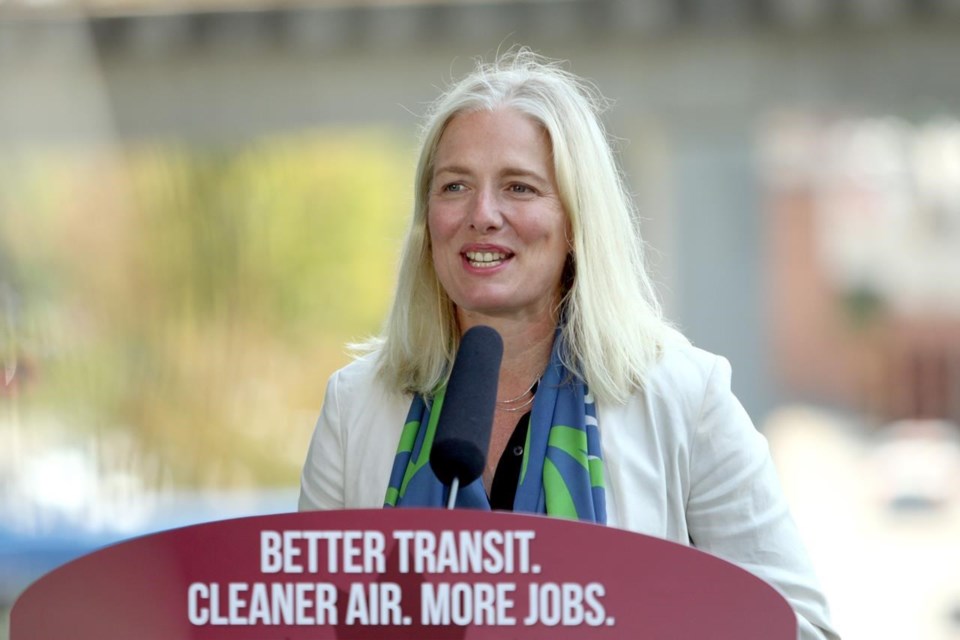TORONTO — Vague promises by banks and businesses to reach net-zero emissions decades in the future risk undermining action needed now, Canada's former environment minister told a UN climate conference Tuesday.
“Too many of these net-zero pledges represent little more than empty slogans and hype. Consumers are right to be skeptical," said Catherine McKenna, speaking in her role as chair of a UN expert group focused on the net-zero question.
Given the risks of inaction, the McKenna-chaired group called on governments to regulate voluntary net-zero commitments, starting with high-impact emitters including large corporations as well as banks and other financial institutions. The call for regulation is one of 10 recommendations in a report the group released Tuesday on ways to restore legitimacy to climate pledges.
"We set very clear red lines on greenwashing. This is what you cannot do, if you announce publicly, you put up your hand and you say I'm a climate leader," said McKenna. "You cannot claim to be net zero by continuing to build or invest in new fossil fuel supply.”
The recommendations include the need for clear, five-year targets on emission reductions and detailed plans to get there, for targets to include total emission reductions across the full scope of an organization, and for pledges to contain specific targets aimed at ending the use and support of fossil fuels.
The report also pushes for restrictions around the use of carbon offsets and of lobbying that's counter to climate pledges, and emphasizes the need for a "just transition" as part of climate commitments that would see financial institutions and multinational companies to take on more risk as part of a ramp up of clean energy investments in developing countries.
“Much of what we recommend is really about common sense and levelling up the playing field, so that net-zero pledges on which so much our future depends have integrity," said McKenna.
The recommendations, coming after broad global consultations, are not so different from what a lot of countries are already pushing toward, but go a good deal further than what Canada has so far proposed, said Janis Sarra, a professor at the Peter A. Allard School of Law at the University of British Columbia.
"We're woefully lagging behind in regulation," said Sarra, an expert in climate-related financial risk. "If we're going to be competitive in global capital markets ... we need to have standards that institutional investors and others can say, OK, you know, Canada's got some integrity."
She said while Canadian companies and institutions are already moving toward many of the recommendations, the need to phase out fossil fuel support stands in contrast to what financial institutions are doing.
Environmentalists have long been calling out banks on their continued funding of oil and gas operations. Stand.earth on Friday pointed out that RBC has provided more than $9.2 billion in funding to the fossil fuel sector since last year's climate conference. On Tuesday the group welcomed the report's recommendations.
“This new standard for net-zero commitments is necessary, especially since banks like RBC actually increased fossil fuel financing this year despite net-zero rhetoric."
RBC declined to comment directly, but pointed to a statement the Canadian Bankers Association put out Tuesday, which notes that banks in Canada are committed to doing their part to address climate change while securing an orderly transition to a low-carbon economy.
The CBA statement also says banks acknowledge firm commitments are required to meet the goal of a net-zero economy, with several having already released climate action plans with specific targets, but that banks will continue to work with their clients across industries to help them transition.
None of the net-zero plans out by Canada's big banks, or oil companies, would pass the greenwash test the UN has set out, said Keith Stewart, senior energy strategist with Greenpeace Canada, by email.
"McKenna and the UN have done the public good a real service here by calling out phoney corporate climate pledges," he said, noting it points to the need for government regulation.
UN Secretary-General Antonio Guterres said Tuesday that current net zero commitments have "loopholes wide enough to drive a diesel truck through," while focusing particular criticism at fossil fuel companies and their "financial enablers."
"Using bogus net zero pledges to cover up massive fossil fuel expansion is reprehensible," said Guterres. "This toxic coverup could push our world over the climate cliff.”
This report by The Canadian Press was first published Nov. 8, 2022.
Companies in this story: (TSX:RY)
Ian Bickis, The Canadian Press



